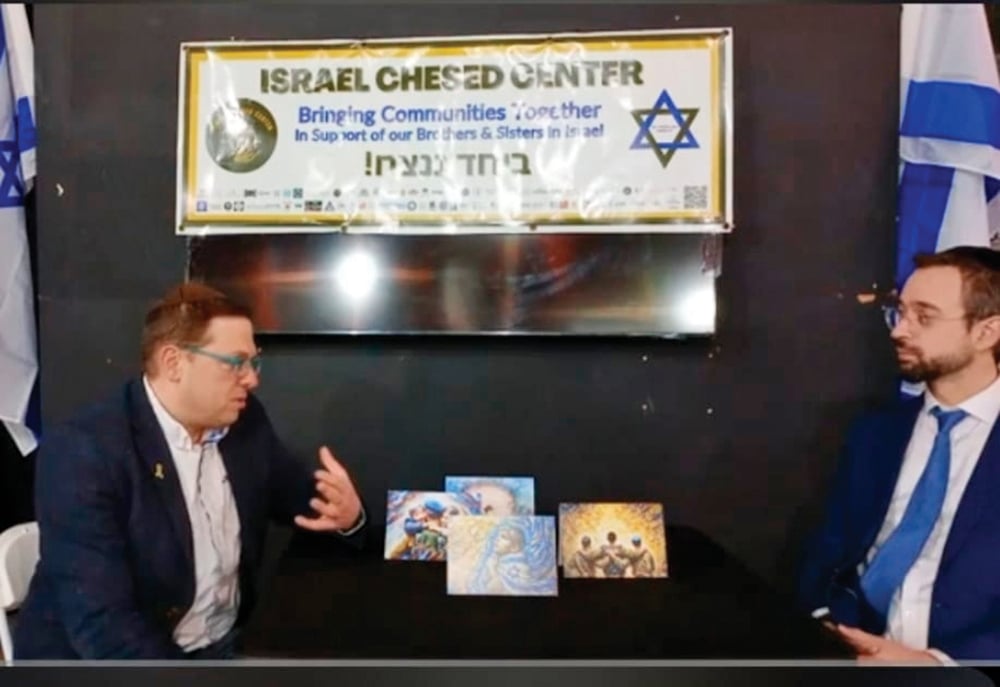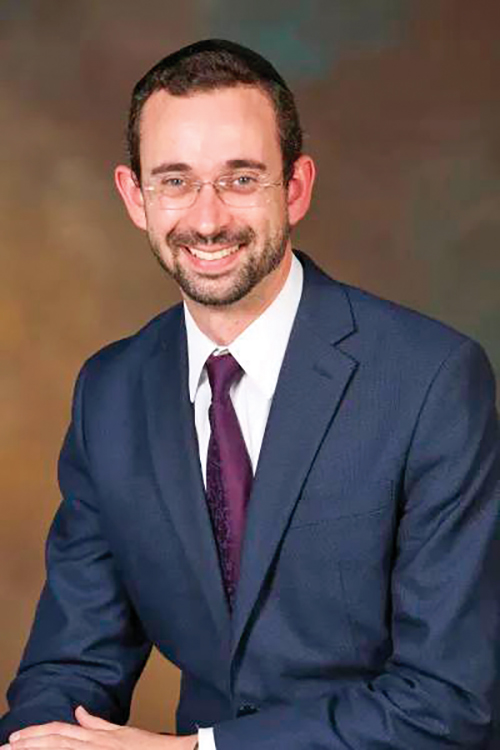
Ariel Serber (AS): I’m with Rabbi Ya’akov Trump. We are going to talk about his involvement at the Chesed Center and with other community initiatives supporting Israel.
Rabbi Trump, I feel like, obviously, the horrors of October 7 were so terrible. But also, I think it’s like the best of us has come out. How have you seen that? How do you feel about that?
RYT: Unfortunately, with October 7, with all the atrocities and terrible things that came from it, it also gave us the opportunity to find October 8th Jews. And those are the folks who often realize that they really want to do something and they really want to get involved. And it’s being able to try to motivate those people to do the right thing. The Chesed Center has really proven an incredible resource in that respect. We take regular folks, people who might not necessarily be writing the checks, but people who can just roll up their sleeves and make a big difference. Bag by bag, item by item, chesed by chesed, connection by connection. And that to me has been the greatest service to Am Yisrael.
Can you talk about your background, your connection to Israel, the state, the land, the people, just from going back?
Sure. I grew up in South Africa. South Africa, unlike America, is very much a Zionistic Jewish community in many ways. The aliyah rate is much higher per capita in South Africa than in America. It’s very much part of the water one drinks there. Having said that, it’s still Diaspora. For me, it was a very moving experience to go to Israel, to learn in Yeshivat Kerem B’Yavneh, and to see what religious Zionism actually means.

For us, here in the Diaspora, how can we be connected, stay connected?
There are different ways I can phrase this, but I would argue that the success of the Jewish communities in Diaspora will be dependent on their level of involvement in the Judaism that they are living. Judaism will only be successful in action, which means to say that people are actually doing, expressing, loving and sharing what they have. Israel, at this point in time, is really providing an incredible kesher for so many people who otherwise perhaps would be apathetic and indifferent. This is allowing them to really make that connection and realize that their story didn’t start in the last generation and won’t end in the next generation. They’re part of something greater. Being part of that, I think, has been a tremendous chizuk to those people who are now reconnected to themselves to be their identity as through this process.
How have you found all that to be impacting the people of Israel when you have conversations with either close family members or people you know?
Actually, I was just speaking recently to Rav Shlomo Kimchi, who’s the head of the Yeshivot Bnei Akiva; they have 24,000 students in the Bnei Akiva system in Israel. He was describing his own children. He was describing when his son was going to the army, he was saying, “I’m wearing a helmet from Canada, I’m wearing a flashlight from New York, I’m wearing boots from Miami.” And he said, “It’s not just that I feel the love, but I also feel like I’m representing all those communities as well.”
How have you found the Israel Chesed Center to be a part of that picture?
The amazing thing about the Israel Chesed Center is that it’s pulled from every community, the people who are motivated and energized about making a difference. It’s an amazing thing because if it were to be centralized from one community, it would be as good as the pool of that community. But this pool is larger because what it does is it pulls from everybody. There are so many talented people in this community who suddenly found each other. That’s the best part about it. Suddenly, you have people who have the creative ability. I was just looking at the walls. There’s a woman in our shul who’s an artist. So she has paintings up there, selling them to the community. There’s another person just doing the runs to the airport. There’s another person who’s found a source to get thermal underwear.
What else would be maybe a call to action, a next step that you feel people should continue in their day-to-day lives as we get further from October 7?
It’s a very hard thing because we’re all exhausted. The truth is, as exhausted as we’re feeling, Israelis are feeling much more exhausted. Every time we say to ourselves that, OK, we’re done, we’ve just got to remember that their children, their husbands, their spouses are still in the army and they’re still doing single parenthood, and there’s a lot of collateral impact. In terms of continuing, I believe that comes down to relationships. It means that as important as it is to send equipment, as important as it is to do events and send money, relationships are incredibly important. Everybody here knows people who are in the army. Many have visited Israel and are connected to people who are there. I believe that now the next stage of the journey is forging long-term relationships, which means even if it’s scheduling some time of the week, that one is actually calling or texting somebody who they know is in service or his family is in service. I think that’s where the long-term healing is going to be important because as much as we’re going to do projects, projects are amazing, but we need to maintain those relationships. I believe that would be an incredible way to connect.
I’ve read reports that when you are in grief, sometimes the best thing people can do is just reach out.
Precisely because the Chesed Center has provided the opportunity of not just sending, but also connecting, I would say it’s to now deepen those connections, which means to say you’ve met the people, you’ve had those interactions. Now pay it forward. Just try to maintain that relationship. And it’s incredibly rewarding. One of the things to do through our shul is mishpacha-to-mishpacha, to pair up families here with displaced families. It’s really long lasting and it’s very motivational to see when they come together.
We are all exhausted but just like when it comes to certain times in life, you just step up. To a large degree much hasn’t changed. There are still hostages, there are still displaced people and there are still people grieving. Which means to say the story is not finished.
I commend every person who has gone above and beyond; we need to continue to stand up for the Jewish people.
I have one guarantee—our children are watching; they will understand and they will do what we do. If we give love and care, they are going to notice and b’ezrat Hashem they will do the same.
Rabbi Ya’akov Trump is the rabbi of the Young Israel of Lawrence-Cedarhurst, and together with Rabbi Zalman Wolowik, is morah d’atrah of the Israel Chesed Center.
Rabbi Trump was interviewed at the Israel Chesed Center on December 15, 2024—the 443rd day since the Simchat Torah Massacre. To watch the complete interview please go to https://tinyurl.com/icc-RabbiTrump.








